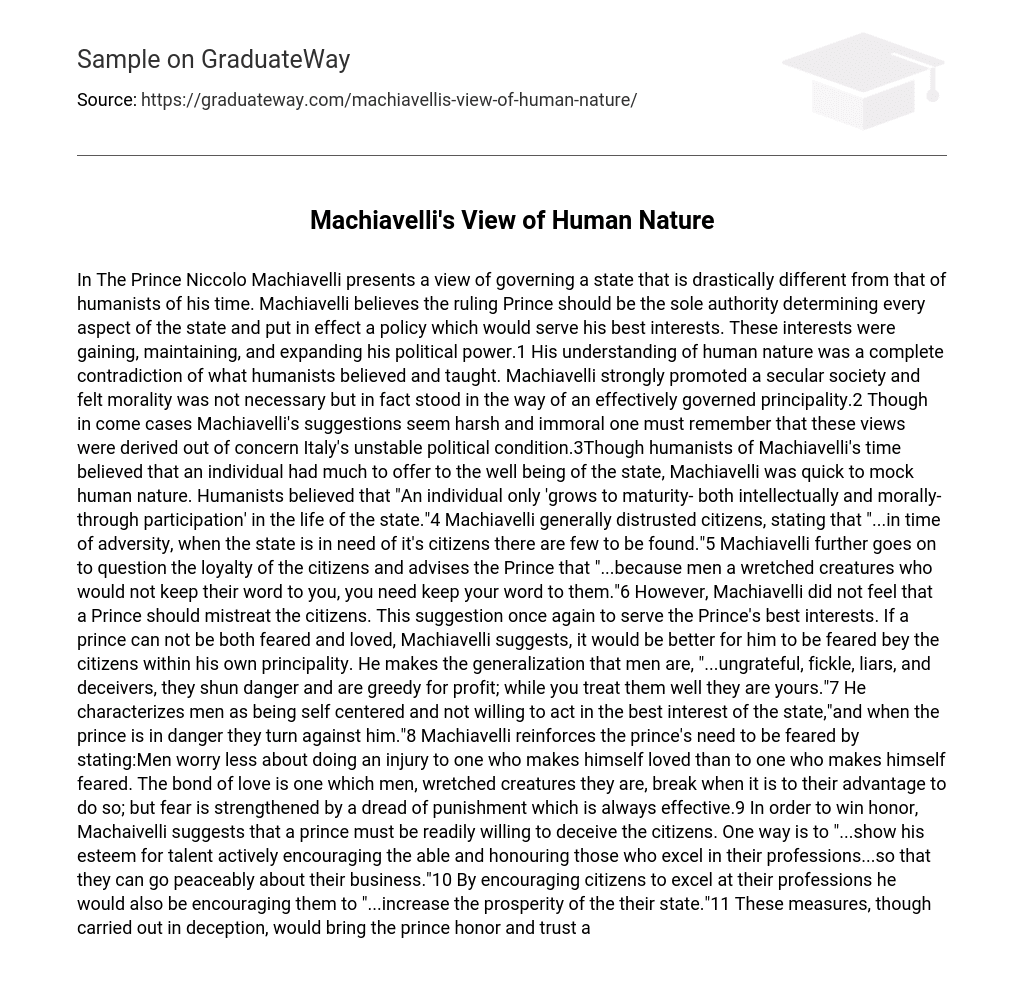Niccolo Machiavelli presents a contrasting perspective on governing a state in his book “The Prince” compared to the humanists of his time. According to Machiavelli, the ruling Prince should possess complete authority over all aspects of the state and should implement policies that serve their own best interests, such as gaining, maintaining, and expanding political power. This viewpoint contradicts the beliefs and teachings of humanists who emphasized individuals’ contribution to the welfare of the state. Machiavelli advocated for a secular society and disregarded morality as unnecessary since it hindered effective governance. Despite his often harsh and unethical recommendations, one must consider they were influenced by Italy’s unstable political situation. While humanists saw potential for positive contributions from individuals, Machiavelli cynically mocked human nature.
According to Humanists, active participation in state affairs is essential for a person’s intellectual and moral development. In contrast, Machiavelli expressed skepticism towards citizens, suggesting that they are often unavailable to support the state during difficult times. He also questioned their loyalty and advised the Prince to fulfill promises cautiously, as men are generally untrustworthy. However, mistreating citizens was not advocated by Machiavelli as it would not benefit the Prince. Instead, he proposed instilling fear in citizens if it was impossible to be both loved and feared. Machiavelli portrayed men as self-centered, unreliable individuals driven by personal gain. He emphasized that fear is crucial for a Prince’s effectiveness since people are less likely to harm someone they love compared to someone they fear. According to Machiavelli, love can easily be broken when there are individual benefits involved whereas fear is consistently reinforced through the anticipation of punishment – an always effective tool. To gain honor, Machiavelli suggested that a prince should be open to deceiving citizens by appreciating talent and actively promoting and honoring those who excel in their professions.This approach allows citizens to peacefully carry out their work which ultimately leads to prosperity for the state.Despite their deceptive nature, implementing these measures would help the prince gain trust and respect from both citizens and influential individuals who may pose a potential challenge to his authority.
In his writings, Machiavelli argues that a prince should practice deception towards those who flatter him. He advises the prince to carefully choose wise individuals for his government and allow them to speak truthfully, but only when solicited for their opinions. Furthermore, he emphasizes the importance of rigorously questioning these advisors and ultimately making independent decisions. According to Machiavelli, people often advise rulers based on their own self-interests, thus the prince must rely on his own judgment. In contrast to medieval beliefs associating the state with humanity’s well-being, Machiavelli supports a secular approach to politics. He dismisses the notion that a ruler’s exercise of power should be justified by promoting the common good or guided by Christian morals. Instead, he advocates for a more pragmatic form of government that prioritizes the prince’s authority and control rather than citizens’ welfare.
Machiavelli believed that a virtuous man would inevitably suffer among those lacking virtue. He suggested that a prince should not be excessively virtuous in order to maintain his rule, but rather strategically use his virtues. These ideas were influenced by Machiavelli’s study and experience of Italy’s political situation, as he hoped they would provide a framework for a future prince to bring about political stability. Machiavelli expressed that Italy eagerly awaited someone capable of saving it from cruelty and was willing to follow a leader who could initiate positive change. Despite Italy’s cultural advancements, Machiavelli did not believe these qualities alone could guarantee its political future.
According to Machiavelli, Italy required a leader who possessed complete authority over its citizens and institutions. He suggested the formation of a non-religious administration, allowing the ruler to govern without moral limitations. Unlike humanists who had faith in individuals’ capacity to contribute positively to society, Machiavelli held a distinct perspective on human nature. He argued that people were primarily driven by self-interest and demonstrated little concern for the welfare of the state.
Although Machiavelli questioned the possibility of creating such a government, it eventually materialized a few years after he authored The Prince. Presently, Machiavelli is recognized as the originator of modern, secular politics.





